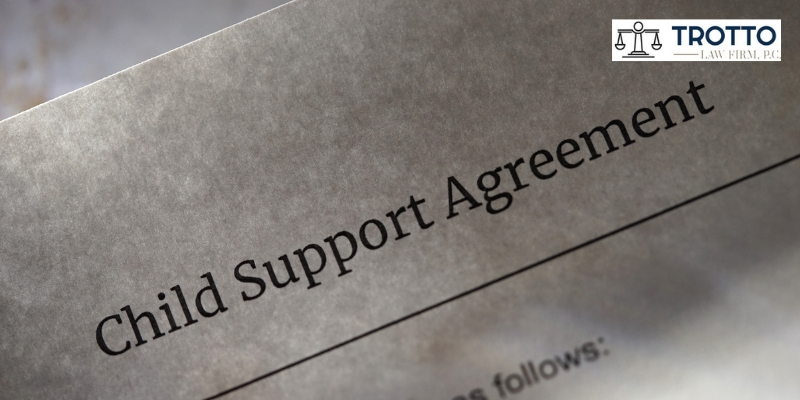Rochester Child Support Lawyer
Rochester Child Support Attorney
Family law is a particularly sensitive branch of legal work, especially concerning the impact it has on the personal aspects of your family dynamic. Child custody and child support are both areas of family law that require the most sensitivity, and the impact that these proceedings have on your children goes beyond the effects of divorce or parental separation. Making sure your legal team has a thorough understanding of your case, as well as experience with family law, is crucial for receiving the support you need to raise your child. In the Rochester area, no other firm compares to Trotto Law Firm, P.C.’s family law expertise.

What Is Child Support?
Child support is a system of financial-related obligations given to the non-custodial parent of a child. Typically paid in monthly lump sums, child support payments are intended for use on monthly medical expenses, education, and general needs to support a child. Although somewhat similar to spousal maintenance, child support payments are directly tied to the welfare of your shared child or children and are independent of spousal maintenance fees.However, spousal maintenance can supplement your childcare expenses. For example, if you have your child enrolled in a tuition-based school system, using your monthly child support payments can be put towards tuition payments as a form of support.

How Are New York Child Support Payments Determined?
The formula for determining the amount of money paid in child support per month is reliant on two large factors: combined spousal income and the number of children placed in the care of the custodial parents. For one child, 17% of the combined income of both spouses is deemed a reasonable amount to be paid in child support. For two children, this percentage is increased to 25%, three children require 29%, and four children would be 31% of that combined income. For five or more children, the minimum percentage of both spouses’ combined income is 35% but can be increased based on the needs of each child involved.
What Contributes to Child Support Payments?
As with any financially based legal proceeding, the factors that go into deciding child support payments revolve around expense calculations concerning both parents. Ranging from income to general financial responsibilities, the factors that go into calculating child support payments go beyond the number of children in need of support, and these money-related features are the biggest aspects in determining your payment rates. Some of these labels and financial factors include:
- Custodial vs. non-custodial delineation: Depending on whether you are named the custodial or non-custodial parent of your children is one of the biggest steps towards determining your hand in child support payments. Custodial parents are those who take on the responsibility of raising your shared children, and the non-custodial parents are those with a more hands-off role in parenting, i.e. supplying child support payments to the custodial parent. Determining this role in your child’s life is the first step toward establishing a child support plan.
- Parent income: As mentioned previously, the income of both parents is necessary for determining accurate, effective child support payments for your children. Beyond calculations based on combined income and number of children, the amount of income-based support each parent can afford is taken into account when determining child support. For example, if a higher income parent is named the custodial parent of your shared child, based on the calculations made with your joint income, the parent with the lower income will most likely pay less in monthly support.
- Child-related expenses: Depending on your child’s health, as well as their education, daycare situation, and general care needs, the financial requirements related to your child support payments can change. For children enrolled in childcare services or tuition-based education, payment for these services is considered when determining monthly child support payments. For medical coverage, depending on the insurance plans of either parent, part of a child support agreement can include healthcare coverage under the non-custodial parent’s insurance provider, which can be factored into monthly payment plans.
- Income disparity between parents: As mentioned previously, the different income levels of each spouse are taken into account when determining child support payments. Besides adding together both parents’ incomes to calculate the percentage-based price of each payment, the ability of each parent to provide that calculated price is taken into account and can be adjusted to adequately suit the needs of the child. If one parent makes significantly more than the other, the calculated total, along with the percentage of the monthly obligation fee that each parent is responsible for, reflects this income disparity and can help create an equitable compensation system.
Child support cases are all different, and the particular factors that affect the price of one case are not applicable in every instance. The obligations of both parents, especially concerning which parent is named the custodial parent versus which one is named non-custodial, play heavily in the court’s decisions regarding child support. The main factor that contributes to primary custody agreements is the court’s decision regarding which parent is better suited to raise the child, and after the establishment of custodial or non-custodial, the process of deciding payment plans for child support can begin.
Are All Child Support Payments in New York the Same?
Due to the specific calculations needed for each child support payment, the likelihood of similar payments coming from two different child custody cases is low.However, the basic math applied in these cases is the same. Although not universal, the process for reaching a comprehensive child support system is similar for each case. As mentioned above, depending on the number of children involved, the amount of money is based on a percentage of the parent’s combined income.
So, for example, if one parent makes around $60,000 a year and the other parent makes $90,000 a year, their combined income of $150,000 is used to determine monthly child support payments. For one child, the payment rate is 17% of that income value, which comes out to $2,125. Based on the percentage of the combined income each parent pays, they will then take over that percentage of the monthly obligation fee. In this example, the parent who makes $90,000 a year would be paying 60% of that monthly fee, which comes out to be around $1,275.
FAQs About Rochester, NY Child Support Law
How much does a child support lawyer cost in N.Y.?
Depending on the escalation of your case, as well as whether your case is contested or uncontested, the length of your case determines the amount you pay in legal fees and services. For an uncontested case, the price of your case is typically lower, with less work going into reaching a verdict. On the other hand, contested cases will cost more money, with more time and effort going into your settlement.
What age does child support stop?
Child support payments can cover children up to 21 years of age, with some restrictions regarding child independence, emancipation, or self-sufficiency beyond parental support. For example, if your child is under the age of 21 but considered “self-sufficient,” whether that be by way of marriage, military service, or emancipation, child support payments will stop based on your child’s ability to provide for themselves.
How does child support work?
Child support is a system of financial support set up between individual parents, where the non-custodial parent provides monetary support to a custodial parent as both a way to make up for their absence and support the primary caregiver. Depending on the number of children shared between both parents, as well as individual financial responsibilities that come with each child, the support system changes to accommodate each situation.
Is there a statute of limitations on child support?
In New York, the statute of limitations regarding child support expires 20 years after the default decision made by the court. If a default decision on child support is enforced by the court, and the non-custodial parent does not make the required child support payments by the time the child turns 21, the custodial parent has the right to request child support back payments for up to 20 years past the court decision date.
Finding a Child Support Lawyer for Your Case
As a parent, your primary obligation is your child, and making sure you can support them is essential to providing them with the best care. In the event of a divorce, making sure your child is supported during such a stressful time is essential to helping them cope, and outside of custody, child support can provide that necessary peace of mind. Depending on your income, your ex-spouse’s income, and whether you are considered your child’s primary caregiver, your child support payments reflect these aspects of your life and aim to support you in as many ways as possible.
Contact Trotto Law Firm,P.C.
Besides providing emotional support, competent legal services during a child support case are crucial for determining the adequate compensation needed for your child. At Trotto Law Firm,P.C., our experienced legal team is well-versed in child support battles and can help you compile a comprehensive case, making sure you receive the benefits you need to help raise your child. For a complete list of our practice areas, visit our website and contact us for a consult today.
Let’s Begin Our Legal Partnership Today
Contact Us
Contact us today using our consultation form below:



